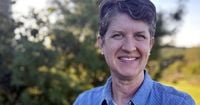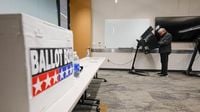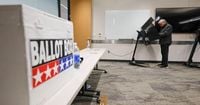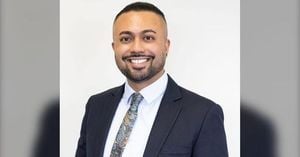Wisconsin voters are heading to the polls on April 1, 2025, facing critical decisions that could shape the educational landscape and voting procedures in the state. Among the most significant issues is the race for State Superintendent of Public Instruction, a position currently held by Jill Underly, who is running for reelection against Brittany Kinser, a consultant backed by the Republican Party.
Underly, who was first elected in 2021, has been vocal about her desire to eliminate school choice in Wisconsin, arguing that it represents the privatization of public education. "So, school choice actually sounds like a pretty nice thing, doesn’t it?" Underly said at a school event in mid-March, as reported by PBS Wisconsin. "Like, who shouldn’t have a choice, right? But really, what it is in Wisconsin is, it’s privatization of public schools." Her stance has ignited a heated debate in a state known for its pioneering school choice programs.
Wisconsin was the first state to implement a comprehensive school choice program in 1989, initially aimed at low-income students in Milwaukee Public Schools. Today, approximately 90,000 students benefit from various school choice programs that allow families to select educational options that best suit their needs. Underly, however, claims that these programs are draining resources from public schools, stating, "Ultimately, yes, I would like to see it eliminated. We are spending so much money on it that it’s taking money from our public schools."
In contrast, Kinser, a former special education teacher and elementary school principal, supports the continuation and expansion of school choice. "I am the only school choice candidate," she declared, emphasizing the importance of providing families the opportunity to choose schools that fit their children's needs. Kinser believes that school choice scholarships offer vital support to low-income families, stating, "Tens of thousands of students across Wisconsin currently rely on the school choice scholarship to attend a school that meets their needs, and I can’t fathom why anyone would want to take that opportunity away."
Critics of Underly's position argue that her claims regarding the financial burden of school choice are misleading. Will Flanders, research director at the Wisconsin Institute for Law & Liberty, pointed out that choice schools receive only about 75% of the funding per student compared to public schools. "Wisconsin’s school choice programs are all significantly cheaper for taxpayers than public schools in the state," Flanders told Fox News Digital. "Dr. Underly is either lying or misinformed."
Adding to the controversy surrounding Underly's campaign is her previous decision to send her own children to private school from 2013 to 2015 before they attended public school after she became the head of a local district. This has raised questions about her commitment to public education. Kinser remarked, "Jill Underly fails to realize that not all families can afford the same private school options she could for her children."
Underly's tenure has also faced scrutiny for alleged changes to state education standards, which critics say lower the bar for student achievement. In response to these allegations, Republican lawmakers introduced legislation aimed at banning the practice of lowering proficiency standards, a move that reflects bipartisan concern over educational quality.
Beyond the education race, voters in Wisconsin will also decide on a proposed constitutional amendment to enshrine a voter ID law, which has been a contentious issue in the state. The law, which requires voters to present photo identification, has been in effect since 2011 and was made permanent in 2016 following a series of legal challenges. Advocates for the amendment argue it will enhance election security, while opponents contend it disproportionately affects marginalized communities, making voting more difficult for people of color, the disabled, and low-income individuals.
Wisconsin is one of only nine states that require photo identification to vote, and its law is regarded as the strictest in the nation, according to the National Conference of State Legislatures. If passed, the amendment would complicate any future attempts by a Democrat-controlled legislature to alter or repeal the voter ID requirement.
The election for State Superintendent of Public Instruction is particularly significant as the winner will guide educational policies during President Donald Trump's second term. Wisconsin is unique in that voters elect their top education official, granting the superintendent broad authority over educational funding and teacher licensing without a state board of education to provide oversight.
Underly, who began her education career as a high school social studies teacher in Indiana, has a long history in education, moving to Wisconsin in 2005 and serving in various roles, including principal of Pecatonica Elementary School. She has garnered support from the Wisconsin Education Association Council and other Democratic organizations.
On the other hand, Kinser, who has worked in various educational roles across different states, is attempting to become the first Republican-affiliated superintendent in over three decades. Her campaign has focused on criticizing Underly's management of the Department of Public Instruction and advocating for school choice as a means to empower families.
As both candidates prepare for the election, the stakes remain high, not only for their political futures but also for the direction of education and voting rights in Wisconsin. With the outcome of these elections poised to influence policies affecting thousands of students and voters, citizens are urged to make their voices heard at the ballot box.







